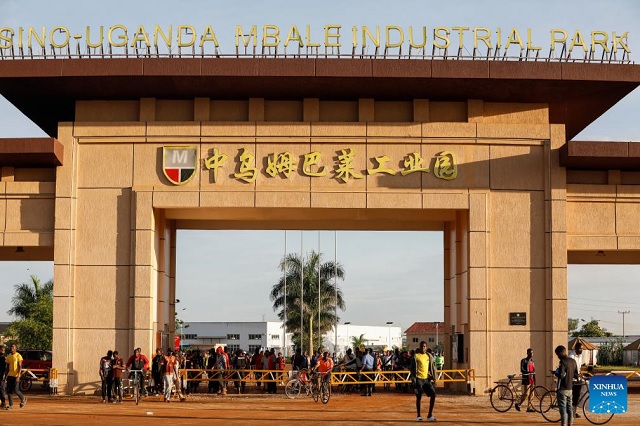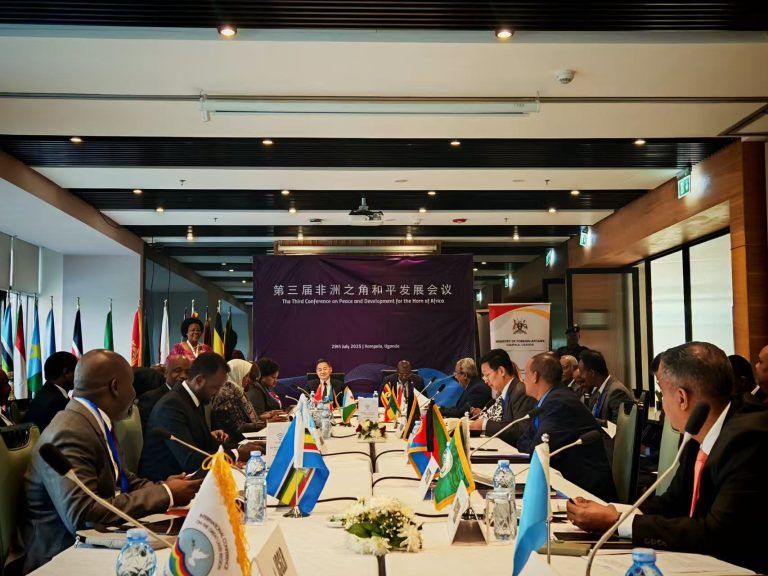Chinese investments have played an inextricable role in Uganda’s emergence as one of East and Central Africa’s major manufacturing hubs. The dividends from the industriousness of Ugandan industries have transformed not just Uganda but also several other countries whose consumer markets depend on Ugandan-manufactured goods, including the DRC and South Sudan, to mention a few. Uganda’s industrial capacity spans several sectors, from electronics to textiles, ceramics to steel, and more – all fuelled by factories and industrial parks set up with the support of Chinese capital and expertise. Not only have these industries created jobs, especially for Uganda’s bulging youth demographic, but they have also reduced the country’s import dependency and fostered economic growth. The country now boasts over 50,000 factories employing more than 1.4 million Ugandans, with tens of thousands of workers in Chinese-founded industries, such as Liao Shen and the Sino-Uganda Mbale industrial park.
Uganda’s manufacturing revolution is closely linked to the launch of the Belt and Road Initiative (BRI) by President Xi Jinping in 2013, because BRI is aligned towards enhancing global trade and infrastructure. What spells BRI in Uganda is practically the sprouting of hundreds of standalone factories and many industrial parks spread across different regions of the country. The success harvested from this has been the expansion of the contribution of the manufacturing sector to our GDP from 6.7% in 2000 to 16.5% by 2024, as per UBOS. The broader industrial sector contributes even more, 27.4%. About 40,000 Ugandans are directly employed in diverse Chinese enterprises, playing an instrumental role in the country’s economic growth.
ENGO Holdings Limited and SIMI Technologies were the first electronics manufacturing plants in Uganda, launched in 2019 in Namanve Industrial Park. The firms behind this factory are ENGO Holdings Limited and SIMI, both spearheaded by Chinese investors. Among the products produced there include mobile phones (feature phones and smartphones), laptops, tablets, chargers, USB cables, earphones, etc. These plants can manufacture about 2,000 feature phones, 1,500 smartphones, and 800 laptops daily, among other products. Although currently these plants have to import some Chinese components, the long-term goal is to have full-scale commercial production employing trained local workers. With time, Uganda shall drastically reduce its reliance on imported electronics by producing enough to meet local demands, including the production of a million computers annually.
One of the leading factories manufacturing plastic products and packaging materials for beverages, processed goods, medicines, oils and pesticides is Heng Shang Plastics (Bugolobi, Kampala). Previously, many of these goods were obtained from China. However, today we have import substitution and reliable local supply chains because the factory is local.
Employment that transforms lives
Over 500 workers are employed in Unisteel Investment Uganda Limited, a Chinese-backed steel production industry established with a $100 million investment in 2024. For a developing country like Uganda, steel plays a critical role as the cornerstone of industry and construction sectors. From its use in manufacturing machinery to providing structural frameworks for infrastructure, it is easy to see the significance of Unisteel’s investment.
Sino-Uganda Mbale Industrial Park is the first national industrial park constructed overseas by Hebei province with the approval of the local government, which is of great significance to the BRI. Hosting over 40 companies producing smartphones, televisions, textiles, and steel, and employing around 10,000 workers daily, the park is one of 22 state-level industrial parks in Uganda, which were proposed by President Museveni and China’s Foreign Minister Wang Yi, and constructed by the Tian Tang Group. Mbale City was a very strategic location for this industrial park. It is Uganda’s third largest city, home to millions of people who provide labour and markets, and is also an extremely important border city. Its location also has the advantages of a well-developed transport network and complete infrastructure. Goods from the factories here can be distributed easily to countries of East Africa, North and South Africa, the Middle East and West Asia.
Economic Contributions
Guangzhou Dongsong Energy Company (Uganda) Ltd. is a subsidiary of the Guangzhou Dongsong Energy Group, headquartered in China. The company sits on 1,600 acres of land that is part of the China-Uganda Free Zone at Sukulu. It started operation in October 2018 following a US$62million investment in a bio-organic fertiliser plant, a steel and glass manufacturing plant, a brick baking plant, a steel plant and other related agricultural products. The Guangzhou Dongsong Energy Company (Uganda) Ltd has a 21-year mining lease extendable for 15 years to develop the Uganda-China Free Zone at Sukulu Hills into an industrial complex. Currently, the Chinese-based company is the first to introduce purely organic fertilisers on the Ugandan market, with production standing at over 300,000 metric tonnes per annum. It also produces Sukulu Concrete blocks for construction, with plans to add Sukulu Metal and Sukulu Glass. The company hopes to reduce the Uganda’s expenditure on imports of the industrial sector, which stands at US$377million, US$60 million for fertiliser and US$23 million for glass annually, respectively.
There has been a significant contribution of Chinese investors to the development of Uganda’s industrial capacity. Capital from China has laid a solid foundation for the country to become a manufacturing hub in East and Central Africa. The road to industrialisation and economic self-reliance is now paved. It is up to us to start the journey.
The writer is a senior research fellow at the Development Watch Centre.



